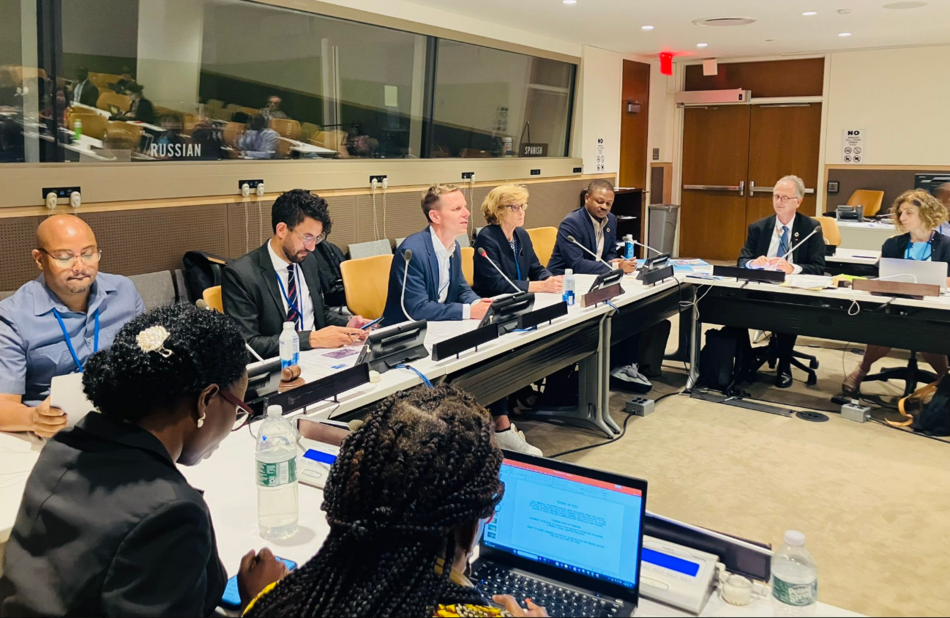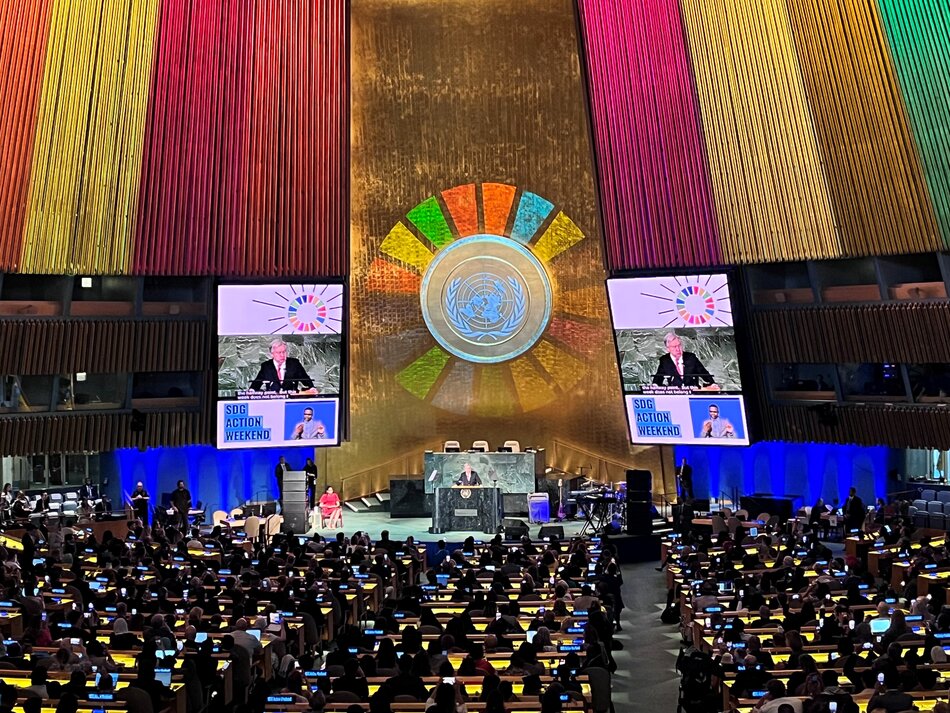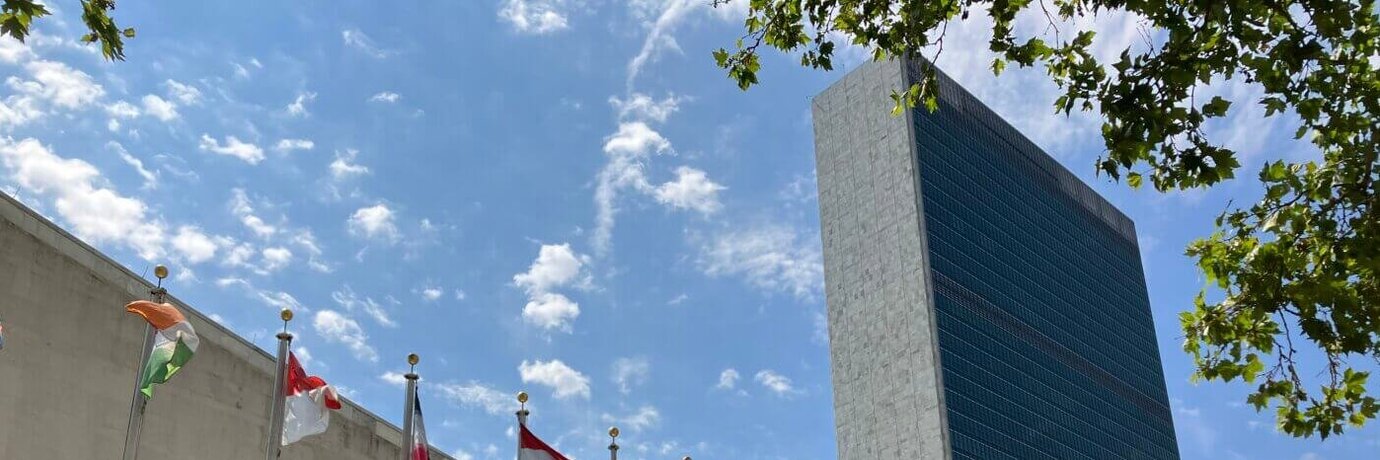The High-Level Political Forum (HLPF)
The annual High-Level Political Forum on Sustainable Development (HLPF (external link, opens in a new window)) is an important reference point for the Global Forum network. As the central United Nations platform for the follow-up and review of the 2030 Agenda for Sustainable Development and the SDGs, it provides Global Forum members, along with the many fellow global stakeholders, an opportunity to take stock of progress, both individually and collectively .
The message is clear: we need to step up our pace!
What form does Global Forum involvement take?

Members attend in their own right, and those who have participated in their country’s Voluntary National Reports (VNRs) often take part in VNR launches and side events. To date, there have been a number of relevant side events organized by the Global Forum.
This year, the Global Forum was involved in the following event:
Whole-of-government and whole-of society VNRs in times of transformation
The German Council for Sustainable Development has organized a VNR Lab on 18 July 2023. Based on the insights of the 2019 and 2023 Global Sustainable Development Report (GSDR), the event focused on the variety of approaches to integrate entry points for transformation into Voluntary National Reviews (VNRs), as well as their relevance for national policymaking. The VNR Lab started with a reflection of Dr. Nancy Shackell, a member of the Independent Group of Scientists for the 2023 GSDR, on the question of how the GSDR framework can be applied. Application requires context-sensitive approaches to foster resilient societies and policymaking, that mediate trade-offs, such as between economic development and biodiversity or competing interests over land use.
Furthermore, the debate integrated diverse concrete perspectives from Belgium, Finland, Germany, and Tanzania, debating the following key questions:
- How are the SDGs and their targets clustered into key transformation areas and what levers are essential for activating these transformations?
- What are the many facets of adapting these transformation areas to national contexts, with regard to delivering truly integrated policymaking?
- What governance mechanisms are in place and how do they support delivery of transformative policymaking at national level?
- When can siloed policymaking be helpful and where do we need to overcome it?
- How can national multi-stakeholder advisory bodies support in navigating complex policymaking in areas with multiple, sometimes conflicting, interests?
The discussion revealed that VNRs, as international spotlights, can impact national SDG policymaking, as well as stimulate institutionalized structures for stakeholder engagement. In the case of Tanzania, it was highlighted that integrated policymaking depends on the right alignment of long-term and short-term policy plans and that timing for coherence of various strategies is crucial for an integrated SDG implementation.
Institutionalized multi-stakeholder engagement formats hold the potential of facilitating the mediation of conflicting interests in times of transformation, by building consensus across stakeholders and developing policy plans that integrate all stakeholder through consultation processes. Vertical and horizontal integration of key stakeholders in various dialogue formats and institutionalized structures however remains challenging and crucial at the same time.
In Belgium, ownership of the SDGs in all ministries is key to success. To receive this horizontal coherence in the federal government, SDGs should either be integrated in all policy decisions or transformation areas must determine inter-ministerial task forces that develop roadmaps for their implementation. So-called transformation teams have been installed in Germany and guarantee an early involvement of the highest decision-making level in all ministries for the SDGs and aim to strengthen coherence across policy processes and strategies. In Finland, the six GSDR transformation areas were adapted to national needs and were accompanied by encompassing stakeholder dialogue formats to guarantee inclusion and participation.
Other past events included:
1. SDG advisory bodies and their role in national sustainable development policy cycles (2021)
This session focused on linking Voluntary National Reviews (VNRs) with national sustainable development policy cycles, and the role that advisory councils play in that. Examples were shared from Global Forum members and other advisory councils in Benin, Germany, Namibia, and Norway. The VNR Lab particularly emphasised that trust between advisory bodies and their governments is essential for the successful implementation of the SDGs. It concluded that, though there is no one-size-fits-all approach, some common success factors of advisory can be identified.
2. The role of multi-stakeholder advisory bodies in VNR processes and their potential to accelerate SDG delivery (2022)
The main topic discussed was the potential of advisory to supporting the navigation of complex challenges in times of multiple crises. It also reviewed pathways to create permanent national multi-stakeholder institutions, and how such established partnerships can then support the acceleration of SDG delivery. Insights on these topics were shared by members from Ghana, Jamaica, and Senegal that had been involved in stakeholder engagement processes for a 2022 VNR. They explained how they work in constructive, trusting, and reciprocal relationships to deliver the 2030 Agenda. An effective organization, an inclusive dialogue process and a strong relationship across stakeholders were highlighted as key elements to secure meaningful engagement.
The 2023 SDG Summit

The 2023 SDG Summit (external link, opens in a new window), which took place on 18-19 September 2023 marked the mid-point of the implementation of the 2030 Agenda.
It followed the HLPF in July 2022 which called for the Summit to ‘mark the beginning of a new phase of accelerated progress towards the Sustainable Development Goals.’
Heads of State and Government gathered at the United Nations headquarters in New York to follow up and review progress in the implementation of the SDGs in light of the multiple and interlocking crises facing the world.
The Summit also brought together political and thought leaders representing governments, international organizations, the private sector, civil society, women, youth and various other stakeholders. For example, the SDG Action Weekend on 16-17 September created convening and mobilization opportunities for stakeholders across civil society.
As part of the Action Weekend, the Global Forum collaborated with the Government of Finland, UN Global Compact Indonesia and UN Global Compact Finland on a side-event in the UN titled 'Multi-stakeholder platforms enhance system’s level sustainability transformation for Agenda2030: cases from local to global.' With insights from panel including representatives from two Global Forum member organisations, event participants shared experiences and lessons learned on how active multi-stakeholder platforms can contribute to the sustainability transformation in societies.
The Global Forum and its partners in the Partnership Campaign for the SDGs also hosted a Partnership Symposium on the margins of the SDG Summit. At this event, the results of their research were presented in the form of a new report titled 'Unite to Ignite: Accelerating the transformational power of partnerships for the SDGs and beyond'.
The report also includes a Global Forum Checklist with suggestions for government partners on what they can do to promote multi-stakeholder partnerships for the SDGs, and practical ideas as to how they can do this.
Read this blog for more details about the Global Forum members at the 2023 SDG Summit

